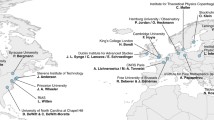Abstract.
The term, “field,” made its first appearance in physics as a technical term in the mid-nineteenth century. But the notion of what later came to be called a field had been a long time in gestation. Early discussions of magnetism and of the cause of the ocean tides had long ago suggested the idea of a “zone of influence” surrounding certain bodies. Johannes Kepler's mathematical rendering of the orbital motion of Mars encouraged him to formulate what he called “a true theory of gravity” involving the notion of attraction. Isaac Newton went on to construct an eminently effective dynamics, with attraction as its primary example of force. Was his a field theory? Historians of science disagree. Much depends on whether a theory consistent with the notion of action at a distance ought qualify as a “field” theory. Roger Boscovich and Immanuel Kant later took the Newtonian concept of attraction in new directions. It was left to Michael Faraday to propose the “physical existence” of lines of force and to James Clerk Maxwell to add as criterion the presence of energy as the ontological basis for a full-blown “field theory” of electromagnetic phenomena.
Similar content being viewed by others
Author information
Authors and Affiliations
Rights and permissions
About this article
Cite this article
McMullin, E. The Origins of the Field Concept in Physics. Phys. perspect. 4, 13–39 (2002). https://doi.org/10.1007/s00016-002-8357-5
Issue Date:
DOI: https://doi.org/10.1007/s00016-002-8357-5




